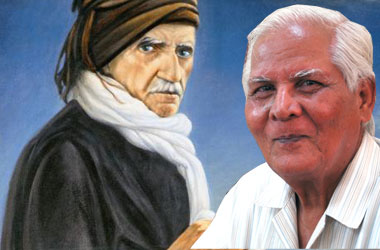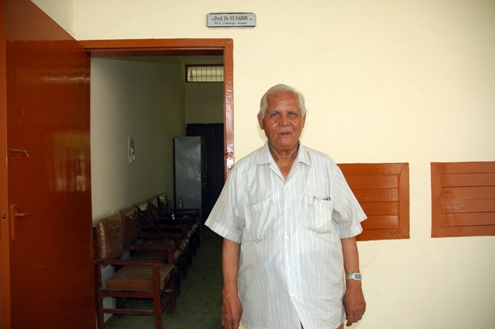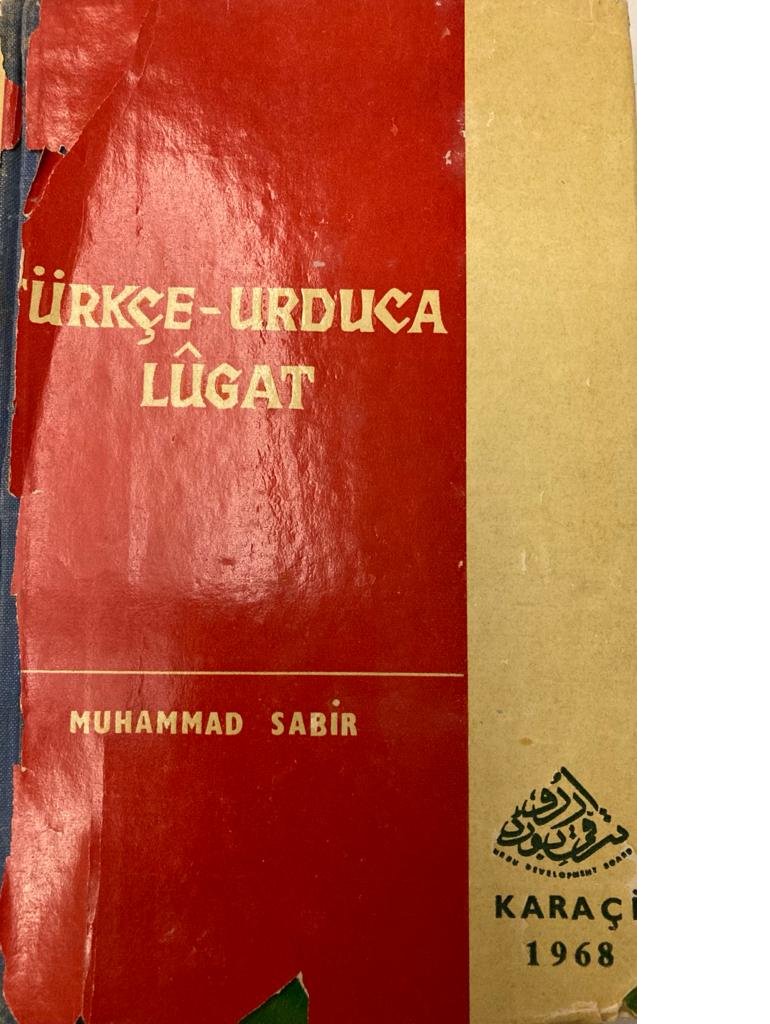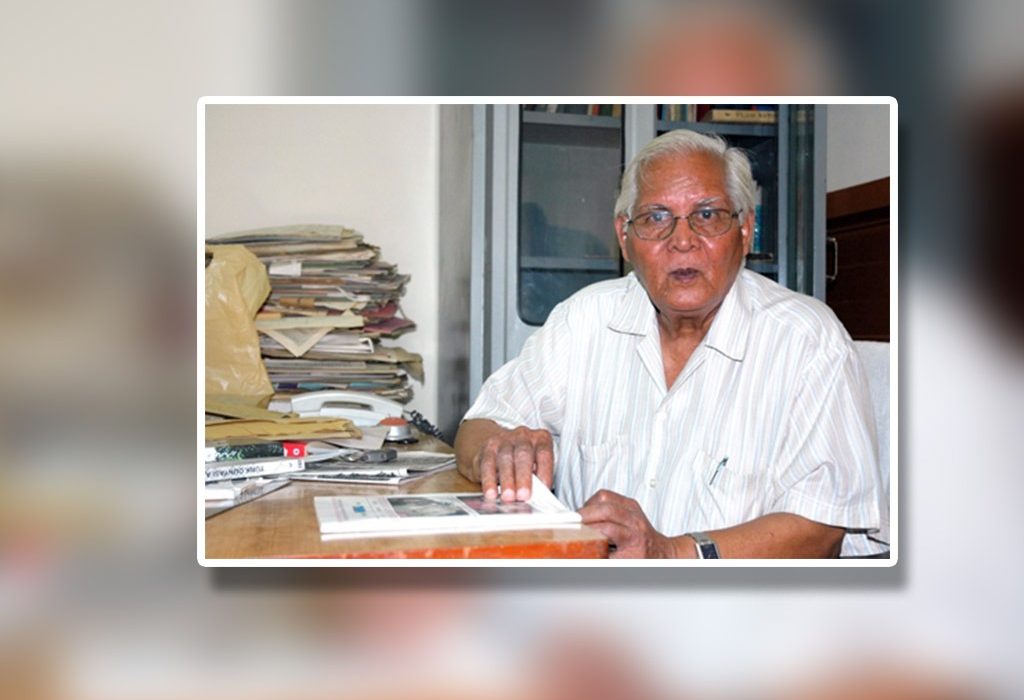A Pakistani in love with Turkey and the Turkish language: Muhammad Sabir*

Pakistan entered my life with a plane crash
January 28, 2021
The great surprise in the reading retreat
January 30, 2021Late Turkologist Prof. Dr. Muhammad Sabir dedicated his life to the fraternal bonds between Pakistan and Turkey. Sabir, who after reading Bediuzzaman Said Nursi’s Risale-i Nur Collection proclaimed himself as a ‘Student of Nur’, also came to Turkey and visited ‘Ustad’ Bediuzzaman at his residence in Emirdag. According to Sabir, only the graduates of the Turkish Schools in Pakistan can nurture and sustain the affinity between the two countries.
There are colossal stars and galaxies far away and so far from sight… Stars and galaxies that blur and disappear in the light of near and smaller stars… Sometimes they shine like the full moon. Until they land in the hands of a keen-eyed jeweller, they remain forgotten. Time draws a curtain in between, and roads become covered in whirling dust. Waters flow over it, and rivers deposit layers of silt in their wake… When sages depart one day, they drift in anticipation for an appreciative pair of hands to arrive with a pickaxe and start digging. One sometimes needs a pair of long-distance binoculars to see them. This is how they wait for years to be caught in the sights of binoculars and remembered so.
I encountered such a dazzling gem five years ago. While teaching Turkish in Lahore, the city of Allama Dr. Muhammad Iqbal, we needed a Turkish-Urdu dictionary to facilitate the teaching and learning of the Turkish language in Pakistan. Neither we nor the bookstores had such a work in publication. While studying Turkish, students would first look in the English and later the Urdu dictionaries to find the Turkish word equivalents. One of my colleagues found a vocabulary compendium published by Prof. Dr. Yaqub Mughal, who had received his doctorate from the Ankara University. Later, when I met Prof. Dr. Mughal during an academic function, I broached the topic and Prof. Mughal told me that Prof. Dr. Muhammad Sabir had compiled an Urdu to Turkish dictionary and published it as single edition 35 years ago in Karachi. Sharing his concern on the lack of an in-circulation Urdu to Turkish (or vice-versa) dictionary in the market, Prof. Mughal said Captain Zafar Hasan Aybek in 1989 had compiled an Urdu to Turkish dictionary published by the Federal Ministry of Education and eventually ran out of print in Pakistan.
A tiny rose from Esteemed Bediuzzaman
When I introduced myself on the phone, telling him my name and explaining my wish, Prof. Dr. Sabir invited me and narrated his life story and memoirs from the years he spent in Turkey. One of his most permanent memories was his meeting with Bediuzzaman in 1958 in Isparta, where he sat and talked with the esteemed scholar. Words fail me as I cannot help but remember with a shudder when Prof. Dr. Muhammad Sabir told me at the time I stood up to leave an experience he fondly remembered with a warm smile and a visible yearning notwithstanding the 50 long years that passed until then: “As a memento of my visit, esteemed Bediuzzaman touched a tiny rose on my face.”

Prof. Dr. Muhammad Sabir had heard about Bediuzzaman long before he could personally travel to Turkey one day. During the Democrat Party (DP) rule in 1950s, the past restrictions were relieved and, with consecutive acquittals awarded to the Risale-i Nur Collection and the students of Nur, the distribution of the Risale-i Nur Collection across Turkey picked speed and eventually crossed borders to reach to Pakistan. Young Muhammad Sabir was introduced to the Risale-i Nur Collection in 1955, three years before his arrival in Turkey. Mr. Salih Özcan, who was then the proprietor and the publisher of the Hilal Magazine and Islam Newspaper, sent him a letter and a book on the life and works of Bediuzzaman Said Nursi through Mr. Yaqoob Dadashi, the Press Attaché at the Embassy of Pakistan in Ankara. Immensely moved by what he had read, Muhammad Sabir started searching for more details about Bediuzzaman’s life and also wrote many letters to him.
Young Muhammad Sabir’s letters to Bediuzzaman were mostly about the Muslim Unity, the communist threats to the Islamic faith and the condition of the enslaved Muslim peoples and countries. In one of the letters, Muhammad Sabir invited Said Nursi to Pakistan. Bediuzzaman not only wrote personal replies to Muhammad Sabir’s letters, he also included some of them in the biographical compilation titled Tarihçe-i Hayat in the Risale-i Nur Collection. In the months that followed, young Muhammad Sabir penned 12 different articles on Bediuzzaman and the Risale-i Nur Collection and got them published in prominent Pakistani dailies like Jang, Dawat, Istiqlal, Asia, and Inquilaab. In one of his letters to Bediuzzaman, Muhammad Sabir also asked his permission for compiling the published articles in book form.
‘Ustad’ Bediuzzaman’s advice to Muhammad Sabir
When he arrived in Turkey to follow his doctoral studies, Muhammad Sabir was also impatient for meeting with Bediuzzaman Said Nursi. Finally, he forwarded a meeting request to Bediuzzaman through Mr. Salih Özcan whom he had known for long and got a positive response. Narrating his visit, Prof. Dr. Muhammad Sabir said: “In 1959, Mr. Salih Özcan assumed the responsibility of securing an appointment for my visit, and sent me with one of his acquaintances to Said Nursi’s residence in Emirdag. Bediuzzaman, who refused visitors in those days, accepted me when he was told I was from Pakistan. He was residing in a two-storey house in Isparta’s Emirdag district. When we entered the house, Bediuzzaman welcomed us while standing. I greeted him and he hugged me in return, saying, “My Pakistani son, welcome!” He was wearing a distinctive imamah. His household items were so plain and old. He asked his students to prepare a meal for me. Ustad asked our permission for eating separately. He said, “I eat very less, but you should eat.” On that day, I ate pilaf and yoghurt with Ustad’s students in that house.”

Hosted for one night at ‘Ustad’ Bediuzzaman’s residence in Emirdag, Prof. Sabir had the opportunity to discuss with him and ask questions on various issues. Bediuzzaman advised Muhammad Sabir to avoid involvement in politics. Prof. Sabir emphasized during our talk, “I followed that advice throughout my life and never became a member in any political party.” At the end of their discussion, Ustad Bediuzzaman treated Muhammad Sabir with a gesture which he had not offered to anyone else earlier: He called one of his students and told him to have the automobile ready, saying, “My Pakistani son, I will see you off personally!”
Our friendship will be sustained by the generations educated in these schools
Prof. Dr. Muhammad Sabir invited us to his Turkish Chair at the University of Karachi many times. During our visits, he would say to us, “I am Pakistani by body and Turkish by soul.” Muhammed Sabir lived in Pakistan as a man deeply in love with Turkey. During the course of his life, he took significant steps for extending the bridges of friendship between Turkey and Pakistan. Having witnessed the tireless efforts of those who received this baton from him for strengthening the friendship between the two countries, Prof. Dr. Muhammad Sabir frequently expressed his joy and contentment originating from the teaching of the Turkish language – to which he dedicated 60 years of his prolific life – by the PakTurk Schools in Pakistan with these words: “Only the new generations educated in the Turkish Schools opened in Pakistan – PakTurk Schools – can convey the friendship between Pakistan and Turkey to the future; a sturdy and sustainable cooperation can be possible in this way only.”
Prof. Dr. Muhammad Sabir İhsanoğlu passed away on November 8, 2009 at age 74 in Karachi.
His life and works
Muhammad Sabir was born on March 13, 1935 in Allahabad, India. After the Partition, he migrated to Karachi, Pakistan with his family by enduring tremendous hardships. He learned Turkish from Haşim Beg Dursunoğlu, a Uighur who settled in Karachi after fleeing from China. Prof. Dr. Muhammad Sabir graduated from the Department of Islamic History at the University of Karachi. Thanks to his deep curiosity towards the Turkish culture and history, he engaged in research and wrote many articles. Before coming to Turkey, he became a member of the Association of Turkish Culture in Pakistan. On his return, he assumed the general secretariat of this association. In 1958 and in line with a cultural treaty signed between Pakistan and Turkey, he was selected among many students and sent to Istanbul to follow his doctoral studies there.
As one of the first Pakistani students in the Department of Turkish Language and Literature at the Istanbul University, Muhammad Sabir completed his doctorate studies between 1958 and 1961 with his dissertation on the prominent Turkish-Muslim poet and philosopher Ali-Shir Nava’i under the supervision of a stellar academic faculty including Zeki Velidi Togan, Ali Nihat Tarlan and Ahmet Caferoğlu. He also conducted extensive research on the Turkish Language Reform. During his three-year study in Turkey on Turkish history, Prof. Dr. Muhammad Sabir additionally benefited from the teachings of the renowned Ottoman historian İsmail Hâmi Danişment. Thanks to his moral courage and enterprising spirit, he met and had acquaintance with various leading Turkish academics and politicians.
He wrote and read Turkish in three scripts

Dr. Muhammad Sabir returned to Pakistan in 1962 and started working as a professor in the Department of Islamic History at the University of Karachi. With the special assistance provided by the then-Turkish Prime Minister İsmet İnönü, Dr. Muhammad Sabir opened the seminal Department of Turkish Language at the University of Karachi in 1963. He continued working for many years at the University as the Head of the Islamic History and Turkish Language departments, and the Dean of the Faculty of Letters. Even after his retirement in 1995, he did not cease his academic proliferation and continued delivering Turkology classes twice a week.
In addition to his mother tongue Urdu, Prof. Dr. Muhammad Sabir was a recognised specialist in Ottoman Turkish, Chagatai Turkish, Anatolian Turkish, Persian, and English. Able to read and write in Turkish through his proficiency in the Latin, Cyrillic, and Arabic scripts, Prof. Dr. Muhammad Sabir authored many books and journal articles. In order to pave the path for the learning of Pakistan’s national language Urdu among Turkish nationals, he authored the first large-volume Turkish-Urdu dictionary in 1968. He also authored many academic articles on Turkish-origin words in Urdu language.
In 1967, he compiled an anthology of Ottoman History titled ‘Turkan-e-Usmani’, an original compendium based on his extensive perusal of the Turkish and Ottoman works, which is still taught at Pakistani universities. He translated several works of Mehmet Âkif, Namık Kemal and several other Turkish authors into Urdu. He also translated Mughal Emperor Zahiruddin Muhammad Babur’s divan from Chagatai Turkish to Urdu. A month before his demise, he completed the Urdu translation of Zahiruddin Muhammad Babur’s work on Sufism titled ‘Rasail-e-Walidiya’.
While the 1974 Cyprus Peace Operation was underway, Prof. Dr. Muhammad Sabir penned nearly 20 articles defending the notion, “Cyprus belongs to the Turks”. He wrote numerous columns and articles on the Central Asia, modern Republic of Turkey, the Middle East and the histories of India and Turkey, and also acted as the interpreter for the Turkish delegations visiting Pakistan.
Excerpts from his letters in Bediuzzaman’s biography ‘Tarihçe-i Hayat’
My purpose is to serve Islam, introduce the Turkish literature, and writing and working against the enemies of Turks. (pp.687)
After this letter of mine, I will write an important letter to you and will explain why you, dear Ustad, are the greatest personality of the Muslim World and that no man like you has emerged from Indonesia, the Pakistani and Indian Subcontinent, Arabia and Africa.
O my friends from the students of Nur! Please work for the friendship between Turkey and Pakistan and stay alert against the communists. We are proud of the fact that Turkey and Pakistan are partners in the Baghdad Pact. Our path is Islamic; it is neither Arabism nor Iranism…
Last month, Sayyid Ali Akbar Shah – who had personally met our Ustad in 1950 – invited me and uttered very exquisite remarks. This gentleman conveys his greetings to Ustad and prayers to the students, and says: “I have been under the influence of two men: One is Mevlânâ Jalaluddin al-Rumi, and the other is Said Nursî.”
***
I have become a Student of Nur
I am a Pakistani Muslim, who had never been to Turkey and never saw Said Nursî. Yet, after deliberating on some excerpts from the books published by the students of Nur at the Istanbul University, I experienced a genuinely spiritual perception. Now in this faraway land, I have become a student of Nur.
There are no such works written in my mother tongue Urdu. Moreover, in India and Pakistan, there is no such hero of the faith like Nursî. This is a fact. If these works get translated into Urdu, we hope they will render great services to Islam.

***
Said Nursi Is the Master Teacher for All Muslim Youth
Esteemed Sir,
I have received the prominent works of our august and eminent master Bediuzzaman Said Nursî. I had not seen his other works earlier. You sent them to me for the first time. My exams are approaching. After May, I will write articles about esteemed Ustad Bediuzzaman and his services to the faith and the Qur’an. InshaAllah – God willing – I will also send you copies from the pieces published here. Even though I do not know you in person, I know you in spirit very well. According to Holy Qur’an, all Muslims are like real siblings… I am writing to you due to your being a brother in Islam to me – especially for being a Turkish Muslim and a student of Nur. I am a Pakistani, and I do not hail from Turkey. My mother tongue is not Turkish, but I am a student of Nur. I acknowledge Bediuzzaman Said Nursî as the most prominent man of religion and thought, and I proclaim myself as a student of Nur. The esteemed Said Nursî is not only your revered teacher, but also the master teacher for all Muslim youth. Unfortunately, there is no one who knows Turkish in our country; this is why, they are not aware of the services rendered by Ustad Bediuzzaman.
I convey you some information from Pakistan about the Risale-i Nur Collection:
I have been endeavouring fairly well for the last two years. I wrote articles to be published in the dailies Pakistan, Bukhara and Birma. I was appreciated so much, and they requested me to write on Turks and the Risale-i-Nur Collection. Earlier, I had no information about Ustad Bediuzzaman. Therefore, I wrote a letter to a young man named Salih Özcan and requested him to send me books on Turkey. He sent me books and magazines. One of them was the Serdengeçti magazine, where I saw an article on the Risale-i Nur Collection. I read the article and it benefited me a lot. I started collecting information on the Risale-i Nur Collection. I wish I could read and write Ustad Bediuzzaman’s works. Since the time I first came to know about him, I read and reflected on his works. Who is he? I soon realized: Enemies of Islam waged propaganda against him. Therefore, I wrote nearly twelve articles about him to this date. These articles on Ustad Bediuzzaman were translated into other languages. Now, it is likely that thousands or maybe millions of Muslim and non-Muslim people know about him. They asked me to give them information about him. Every newspaper wishes to publish an article about him. InshaAllah, after three months, I will work on this issue with all my energy. I have no fear of the enemies of Islam. In Karachi, I collected Ustad Bediuzzaman’s books and other books in Turkish to form a library. I keep all of the books I received from Turkey there.
***
Friends in the Service of Nur Should Learn Urdu
I request our friends in the service of Nur to learn the Urdu language to strengthen the bonds of the friendship between Turkey and Pakistan. The national language of 130-million strong Muslims in this Subcontinent is Urdu only. We are working for the Turkish language here. 60 million Muslims from Siberia to Albania and 25 million Turks in Turkey speak Turkish.
***
Ustad Bediuzzaman is the jewel of the Muslim World. There is quite less information about him. His works have yet to be translated into Persian, English, and Urdu. However, it will surely happen in the future.
***
We Pakistanis consider Turkey as the leader of the Muslim World.
Turkey is the westerly citadel of the Muslim World. No unity in Islam cam be possible without Turkey’s existence. I sent you my articles on Ustad Bediuzzaman. In Pakistan, there is neither a Turkish school, nor a Turkish library, nor Turkish workers, and nor Turkish Embassy personnel who know Urdu. They are not in contact with the youth in Pakistan; there is also no Urdu publication on Turkey. The officials from your Embassy do not attend to the programs where they are invited. There is also no book or information on religion in the Office of the Press Attaché at your Embassy.
***
Since the days when Prof. Dr. Muhammed wrote these lines with great sadness, many things have changed by the grace of Allah. Nowadays, not only in Pakistan, but also in all corners of the world, there are Turkish schools where rose-complexioned teachers with luminous faces teach the Turkish language. They spread knowledge, wisdom, and light not only in Pakistan but also worldwide, while educating the Muslim World’s seeds of hope…
(*) This article was first published in the July 2013 issue of the monthly Sızıntı magazine.





No Comment.